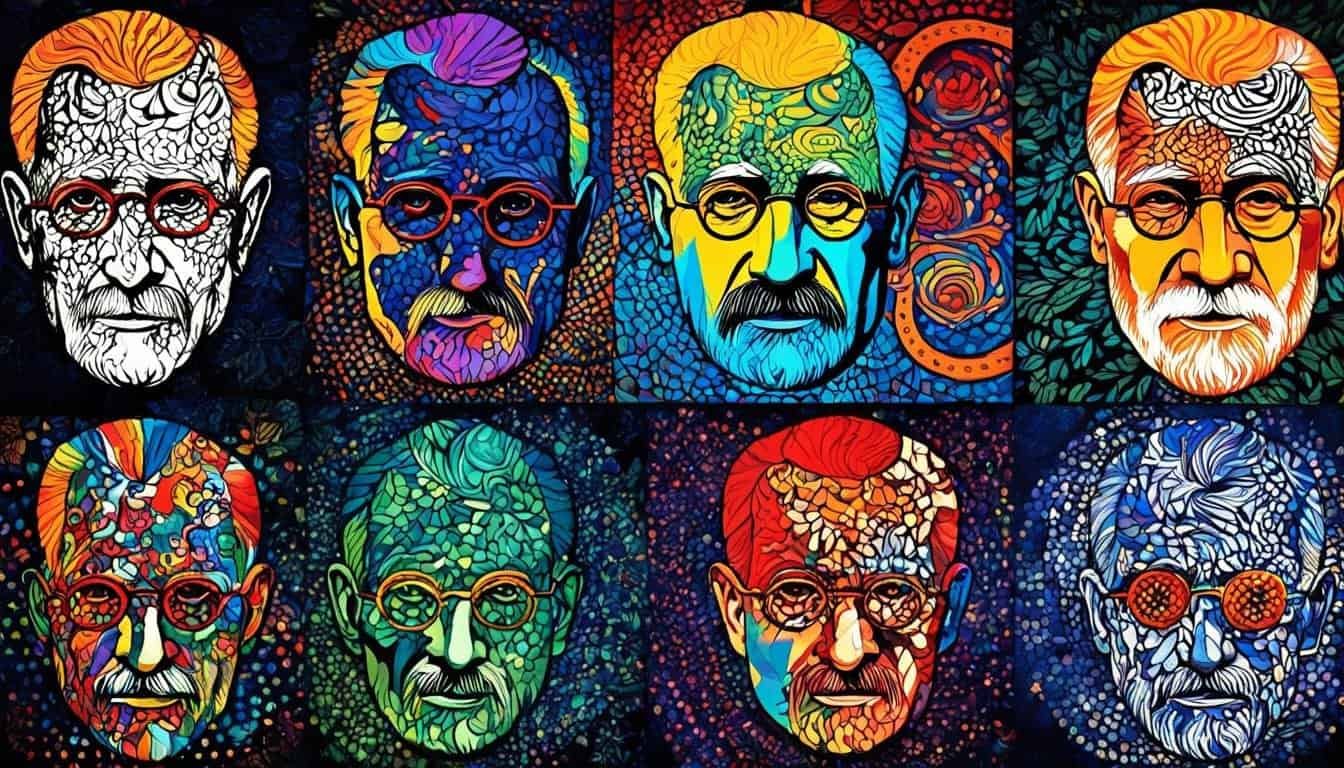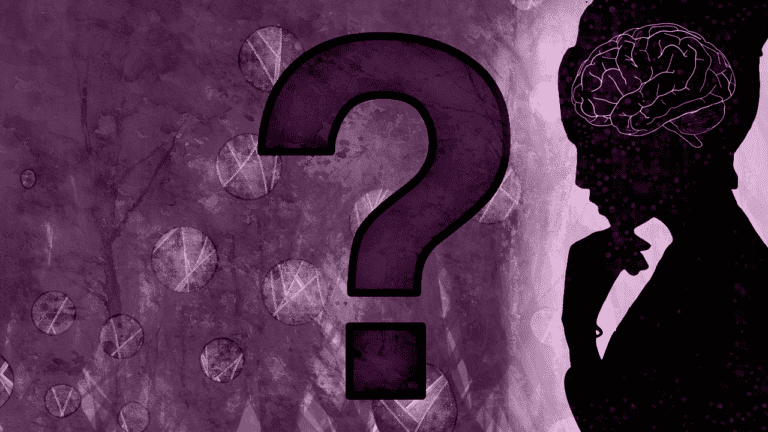Understanding Sigmund Freud’s Psychosexual Stages
Welcome to our comprehensive guide on Sigmund Freud’s psychosexual stages, a foundational concept in the field of psychology. Freud’s theory focuses on the role of childhood experiences in shaping personality development and understanding human behavior.
In his psychoanalytic theory, Freud proposed five distinct stages that individuals navigate during their early years. Each stage is characterized by conflicts and the gratification of the libido, or sexual energy, in different erogenous zones. By successfully resolving these conflicts, individuals progress through the stages and develop a healthy and balanced personality.
Key Takeaways:
- Freud’s psychosexual stages theory describes the psychological development that occurs during childhood.
- Successful completion of each stage leads to a healthy personality, while unresolved conflicts can result in fixations and psychological issues later in life.
- The stages include the oral, anal, phallic, latent, and genital stages.
- Freud’s theory has been both praised for its contributions to psychology and criticized for its lack of scientific evidence and focus on male development.
- Despite its criticisms, Freud’s psychosexual stages theory remains influential in the study of human development and personality.
The Oral Stage
The oral stage is the first psychosexual stage proposed by Sigmund Freud, which occurs from birth to around 1 year old. During this stage, the infant’s primary source of pleasure and interaction is the mouth. This includes activities like sucking, tasting, and biting.
According to Freud, the key conflict of the oral stage is the weaning process, where the child must become less dependent on caregivers for nourishment. Successful completion of this stage leads to trust, comfort, and a healthy sense of autonomy.
However, unresolved conflicts during the oral stage can result in an oral fixation. An oral fixation manifests as over-dependency or aggression. Individuals with an oral fixation may seek oral stimulation as a way to fulfill their needs and cope with stress. This can manifest in behaviors such as smoking, drinking, or overeating.
It is important to note that the oral stage lays the foundation for interpersonal relationships and sets the stage for future psychosexual development. The experiences and conflicts during this stage shape the individual’s personality and their approach to dependency and aggression as they grow older.
| Positive outcomes of the oral stage | Negative outcomes of the oral stage |
|---|---|
| Trust | Oral fixation |
| Comfort | Over-dependency |
| Healthy sense of autonomy | Aggression |
The table above summarizes the positive and negative outcomes associated with the completion or non-completion of the oral stage.
The Anal Stage
The anal stage is a crucial phase in Sigmund Freud’s psychosexual stages theory, occurring between the ages of 1 and 3. During this stage, your child’s focus shifts to the control of bowel and bladder movements. The major conflict that arises in this stage is toilet training, where your child learns to control their bodily needs.
Successful completion of the anal stage leads to a sense of accomplishment, independence, and the ability to follow societal norms. However, if your child experiences either harsh or lenient toilet training, it can result in an anal fixation.
An anal fixation can manifest in different ways. If toilet training is too strict, your child may develop an anal-retentive personality, characterized by rigid and orderly behaviors. On the other hand, if toilet training is too lax, an anal-expulsive personality may emerge, leading to messiness and rebellion.
The table below provides a comparison of the different outcomes of the anal stage:
| Anal Fixation | Manifestation |
|---|---|
| Anal-retentive | Rigid, orderly behaviors |
| Anal-expulsive | Messiness, rebellion |
The Phallic Stage
The phallic stage is a crucial period in a child’s psychosexual development, occurring between the ages of 3 and 6. During this stage, your child’s attention and pleasure focus on their genitals, and they become more aware of anatomical sex differences.
According to Sigmund Freud, this stage is characterized by the emergence of the Oedipus complex in boys and the Electra complex in girls. Boys develop feelings of desire towards their mothers and see their fathers as rivals for their mother’s affection. On the other hand, girls develop feelings of penis envy and develop a sense of competition with their mothers.
Freud believed that these complex emotions are resolved through a process called identification, where the child adopts the characteristics of their same-sex parent. Through identification, boys internalize their father’s values and behavior, while girls internalize their mother’s qualities.
However, unresolved conflicts during the phallic stage can have significant impacts on a child’s psychological and emotional development. If the child fails to resolve the Oedipus complex or Electra complex, they may experience issues with self-esteem, promiscuity, and difficulty forming healthy relationships in adulthood.
It is important to note that Freud’s phallic stage theory has garnered criticism over the years for its limited empirical evidence and its focus on heterosexual development. However, it remains a significant concept in understanding sexual development and its impact on the formation of personality and relationships.
The Latent Stage
The latent stage is a crucial phase of Sigmund Freud’s psychosexual development theory. This stage spans from around 6 years of age until puberty. During this period, the child’s sexual energy lies in a state of dormancy, as the focus shifts from the exploration of sexual desires to the development of social skills, values, and relationships outside of the family unit.
It is during the latent stage that children engage in activities aimed at enhancing their communication skills, fostering self-confidence, and exploring non-sexual interests. This stage provides an opportunity for children to develop vital social skills that are essential for forming and maintaining healthy relationships with peers and adults.
Fixation at this stage can have lasting implications. Individuals who experience fixation in the latent stage may demonstrate immaturity and struggle with forming meaningful connections with others in adulthood.
The Importance of Social Skills and Self-Confidence
The latent stage plays a pivotal role in the development of social skills and self-confidence. As children interact with their peers and engage in activities outside of the family environment, they learn valuable lessons about cooperation, empathy, communication, and conflict resolution.
Developing strong social skills enables individuals to navigate social situations effectively, foster meaningful connections, and thrive in various social environments. These skills are vital for building personal and professional relationships throughout life.
Self-confidence, another crucial aspect of the latent stage, helps individuals believe in their abilities, express themselves assertively, and tackle challenges with resilience. Nurturing self-confidence during this stage can lead to a stronger sense of self-worth and pave the way for personal growth and success in future endeavors.
Overall, the latent stage of Freud’s psychosexual development theory emphasizes the importance of acquiring social skills and building self-confidence. Successfully navigating this stage sets the foundation for healthy social and emotional development, enhancing an individual’s overall well-being.
Key Features of the Latent Stage
Throughout the latent stage, children shift their attention from the exploration of their own sexual desires to engaging in activities that foster personal growth and broaden their understanding of the world. Here are some key features of the latent stage:
- Repression of sexual energy: During this stage, the child’s libido remains dormant, allowing them to focus on non-sexual aspects of life.
- Development of social skills: Children learn to interact with peers and develop vital social skills necessary for successful relationships.
- Exploration of non-sexual interests: The child explores various hobbies, interests, and activities that contribute to their personal growth and development.
- Enhancement of communication skills: Language and communication skills continue to develop, enabling children to express themselves effectively.
- Formation of values and moral standards: Children start internalizing societal norms, values, and moral standards during this stage.
“The latent stage provides children with the opportunity to build social skills, gain self-confidence, and explore new interests. It is a crucial period of development that lays the foundation for future relationships and personal growth.”
The Genital Stage
The genital stage is a critical phase of development that occurs during puberty and continues throughout adulthood. During this stage, individuals experience a surge in sexual interest and curiosity, often directed towards the opposite sex. The primary focus of this stage is the establishment of healthy sexual relationships and the development of a balanced approach to fulfilling one’s desires while considering social norms and the well-being of others.
At this point in Freud’s psychosexual theory, the ego and superego are fully formed and functioning, allowing individuals to navigate the complexities of their desires and societal expectations. Successful completion of the earlier stages lays the foundation for a well-rounded, warm, and caring individual who can form healthy relationships based on trust and mutual respect.
However, unresolved conflicts from previous stages can hinder the individual’s progress in the genital stage. For example, if there were fixations or unresolved issues during the oral, anal, or phallic stages, this could manifest as frigidity, impotence, or difficulties in forming and maintaining healthy sexual relationships.
It is worth noting that Freud’s theory primarily focused on heterosexual development and largely disregarded homosexual development. This limited perspective has been criticized by later psychologists, who recognize the importance of acknowledging and understanding the diverse range of sexual orientations and identities.
The Balancing Act
During the genital stage, individuals strive to strike a delicate balance between their own desires and societal expectations. It is a period of self-discovery and exploration, where sexual interests and attractions take center stage. While it is natural to experience increased curiosity about one’s own sexuality and sexual interests, healthy relationships require an understanding of boundaries, consent, and respect for others.
It is essential to navigate the genital stage with an open mind and a willingness to communicate openly, seeking consent and ensuring that one’s actions align with the principles of respect and mutual consent.
The Role of Healthy Relationships
Healthy relationships play a crucial role during the genital stage. Nurturing and supportive relationships provide a safe space for individuals to explore their desires, express their emotions, and establish intimacy. In such relationships, open communication, trust, and mutual respect are the foundations for maintaining a harmonious and fulfilling partnership.
Healthy relationships during the genital stage foster personal growth, emotional support, and the development of a strong sense of self within the context of a connected and loving partnership.
Criticisms of Freud’s Theory
Freud’s psychosexual stages theory has faced several criticisms over the years that have questioned its scientific validity, feminist perspectives, reliance on case studies, and inadequate inclusion of homosexuality.
Scientific Validity: Some critics argue that Freud’s theory lacks scientific rigor due to the difficulty in testing concepts like libido, which is abstract and unobservable. The theory’s reliance on subjective interpretations of patients’ experiences and Freud’s own case studies also raises concerns about its empirical basis.
Feminist Perspectives: Freud’s theory has been criticized from a feminist standpoint for its phallocentric perspective, which places excessive emphasis on male development and the role of the penis in psychological development. This narrow focus disregards the experiences and perspectives of women and has been seen as reinforcing patriarchal norms.
Reliance on Case Studies: Freud’s theory heavily relied on case studies and retrospective accounts from adult patients, introducing potential biases and limitations in terms of accuracy and generalizability. The lack of direct observation of children undergoing psychosexual development raises questions about the theory’s applicability to all individuals.
Exclusion of Homosexuality: While Freud did not consider homosexuality an illness or shameful, his theory largely overlooked homosexual development. The explanations for sexual preferences in Freud’s theory were based on societal norms and lacked scientific evidence, leading to criticism for neglecting the experiences of LGBTQ+ individuals.
“Freud’s psychosexual stages theory has faced criticisms regarding its scientific validity, feminist perspectives, reliance on case studies, and inadequate inclusion of homosexuality.”
These criticisms highlight the limitations of Freud’s psychosexual stages theory and the need for a more comprehensive understanding of human development that considers diverse perspectives, scientific evidence, and the complexities of sexuality and gender identity.
| Criticisms | Issues |
|---|---|
| Scientific Validity | Difficulty in testing abstract concepts like libido and reliance on subjective interpretations and case studies |
| Feminist Perspectives | Phallocentric bias and limited focus on male development, neglecting the experiences of women |
| Reliance on Case Studies | Subjective nature of case studies and retrospective accounts, lack of direct observation of children |
| Exclusion of Homosexuality | Neglect of homosexual development, explanations based on societal norms and lacking scientific evidence |
The table above summarizes the major criticisms of Freud’s theory, highlighting the specific issues raised by critics. It is important to consider these criticisms when evaluating the applicability and limitations of Freud’s psychosexual stages theory in understanding human development and personality.
Freud’s Contributions and Legacy
Despite its criticisms, Sigmund Freud’s psychosexual stages theory has made significant contributions to the field of psychology and left a lasting legacy. It introduced the groundbreaking concept that childhood experiences play a crucial role in shaping personality development, revolutionizing our understanding of human behavior.
One of Freud’s key contributions was his emphasis on the unconscious mind. He brought attention to the idea that our thoughts, desires, and motivations are influenced by hidden forces beyond our conscious awareness. This notion sparked the development of psychoanalysis, a therapeutic approach aimed at uncovering unconscious conflicts and providing insights into psychological issues.
“The mind is like an iceberg; it floats with one-seventh of its bulk above water.” – Sigmund Freud
Furthermore, Freud’s focus on early childhood experiences and their impact on later development was groundbreaking. He recognized the formative nature of these early years and how unresolved conflicts during the psychosexual stages could lead to fixations and psychological issues in adulthood.
Freud’s developmental theories have influenced subsequent psychological perspectives. They have served as a foundation for later researchers and have inspired various interpretations and extensions. For instance, Erik Erikson expanded upon Freud’s work by proposing a psychosocial stages theory that encompasses the entire lifespan and addresses broader socio-emotional aspects of development.
While Freud’s theory may not be fully supported by empirical evidence and has faced criticism due to its heavy reliance on case studies, his contributions cannot be dismissed. Freud’s revolutionary ideas have shaped our understanding of human development and continue to influence the study of psychology today.
Conclusion
In conclusion, Sigmund Freud’s psychosexual stages theory provides valuable insights into the development of personality during childhood. Each stage, from the oral to the genital, plays a crucial role in shaping an individual’s psychological and emotional well-being. Successful completion of these stages leads to a healthy personality characterized by trust, independence, and the ability to form fulfilling relationships.
However, Freud’s theory has faced criticism for its lack of empirical evidence and its focus on male sexuality, often neglecting other aspects of human development. Despite these criticisms, Freud’s contributions to the field of psychology and developmental theories cannot be dismissed. His emphasis on childhood experiences and the unconscious mind has significantly influenced the study of human behavior.
While modern psychology has evolved since Freud’s time, his psychosexual stages theory still serves as a foundation for understanding the complex interplay between early experiences, human desire, and personality development. By recognizing the impact of unresolved conflicts in each stage, individuals can gain valuable insights into their own psychological well-being and work towards resolving any underlying issues.







